First released: January 2000
Boogiepop Phantom is a series which immediately makes one wonder whether their television is functioning correctly. Shortly after the melancholy opening it adds the speakers to that list. By the end of the first episode it adds the viewer's brain. It is a reverie of madness, murder, altered states and narrative intrigue: each episode teasing an explanation but rarely delivering in full, each appearance of the titular Boogiepop - or is it the Manticore? - promising a new thread to tie in with the myriad others. Existing in a microcosm of light novels, manga and a live-action movie as well as sharing idiosyncrasies and the brutally obtuse style of its spiritual predecessor, Serial Experiments Lain, the question the series' lineage poses is whether it can stand by itself or whether it relies too much on its forebears and source material to support itself.
A month before the opening of the series, a pillar of light erupts in a nameless cityscape, dragging it into darkness. Those who witness the light began to change, much like the city itself, now with a permanent aurora in the sky and a magnetic field that makes compasses useless and corrodes metal at a frightening rate. Those who changed exhibit strange powers: the ability to see and consume insects clutching peoples' chests, the power to separate composite objects like coffee or humans even the capability to show people scenes of their pasts. All the while they are stalked by the urban legend Boogiepop, supposedly the personification of death, who appears without warning to rid the world of the deviations that have sprung up. Clandestine talk of impossibly powerful corporations and unnatural evolution ensure that understanding the circumstances behind all of the strange occurrences will not be straightforward.
Approaching the series lightly is a sure-fire way to be left confused and adrift in a wash of names and out of sequence events; characters drift in and out of the story with brief or sometimes fatal conclusions and only the chance meetings between them keeps the story coherent. That is until two thirds of the way through when Nagi Kirima, one of the select few names detailed in the opening, begins to pull individual story threads together. Unfortunately otherwise timely exposition is obscured by out-of-context conversations, riddles, titles and analogies that up until then had only been glancingly mentioned. Just as the narrative begins to obtain some cohesion, a sub-plot dominates the final episodes before an incongruous finale exposes relationships and events that were only obliquely inferred before. It's infuriating, even more so when it becomes apparent understanding requires prior exposure to other Boogiepop media, making the series essentially a dense and narratively unsatisfying segue from the books.
A boon then that so many other areas are so capably produced. The ensemble cast each occupy more or less an episode each, and though some recurring characters such as the antagonistic doctor and the troubled pregnant woman are smeared across several, each instalment is a short vignette of life. These are lives most altered though as whether through the pillar of light or weakness of personality, some of the darkest aspects of humanity are explored with obsession, madness and memories playing a key role in many of them. Individually the episodes maintain a humanity that has echoes of series such as Mushishi and although dealing primarily with high-school students, the situations are diverse and delve into self-loathing, suicide, passion and depression. There is a voyeuristic pleasure to watching the drama unfold despite many of the subjects acting almost mechanically at times with consequence rarely preceded by cause.
This is not helped by the animation, although headed up by Madhouse and supplemented by others including SHAFT, is sketchy and angular, rarely moving beyond the necessary. Much of this may be due to the washed-out barrel-distortion which constantly rings the view and makes dark scenes nigh-on impenetrable but often masks what would otherwise be egregious shortcuts. Character designs are universally poor with only the iconic Boogiepop and the square-jawed policeman standing out, compounding the confusion suffered from the barrage of names which are sprung upon the viewer in the opening episodes. In short: there is little to suggest this is anything other than substandard animation hidden behind an arguably courageous stylistic façade.
A shame when acoustically the series is par-excellence. Playing a huge part in the experience, its no surprise that veteran sound director Yota Tsuruoka has also worked on other ultrasonic assaults such as the sublime Ghost Hound, Serial Experiments Lain as well as the delectable RahXephon. Audio is rarely left untouched with white noise, distortions, reverbs and all manner of other audio trickery stirred in, designed to envelop and challenge upon listening. The soundtrack is similarly unusual with a typical score absent in place of extended tracks from notable and auteur sound makers such as Flare, SiLC, Audio Active and Sugar Plant - each track a blend of infectious rhythms and complex sounds, all chopped and mixed multiple times during an episode. The effect is almost supernatural and builds an atmosphere entirely unique to the series, whereas Ghost Hound washed over and drew you under, this keeps the ears active but the mind foggy.
In parts then, the series is of varying quality: overall the story lacks drive and focus yet individual episodes are satisfying, the visuals are bereft of detail and movement but the audio is utterly enthralling. Surprisingly the end result does not average out to mediocre but a series that in aggregate is an experience more than a story. Getting lost within the slice of time the story is set in - chunky mobile phones and boxy CRT computer monitors - is enticing and from start to finish the production does everything to keep you there, even the vocal opening and ending songs become part of the atmosphere. Dark alleys, abandoned buildings, hospitals, public transport and schools, the series tries hard to be life but subverted, playing on the idea that the chaotic supernatural is always only a heartbeat away.
Many elements may feel lifted directly from Lain - the electromagnetic hum, the shadowy patterns of Boogiepop's cloak, even the Type-S drug bears similarities to Accela; however Boogiepop Phantom is its own creation, crafting a world and environment that will be familiar and seductive to those who have pondered Lain and shunned the ending to Ghost Hound. It is a harsh and abrasive show that doesn't reward perseverance, one comes out of the series knowing only a little more than when entering; but for those who enjoy being challenged or entertain a borderline abusive relationship with story integrity then there are few series that can offer what this one does. Whether this can be classed as a good introduction to the expansive media experience of Boogiepop or even as a decent complement to them remains debatable, as a niche interest title however, this remains a thorny pleasure.
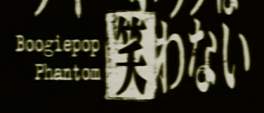
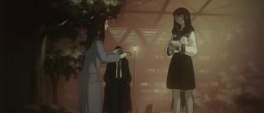
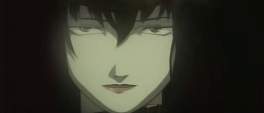
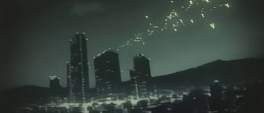
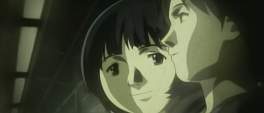
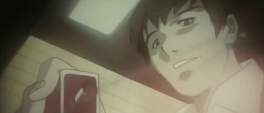
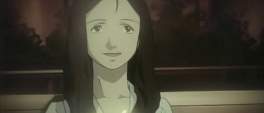

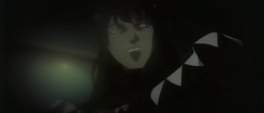
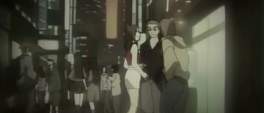
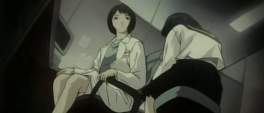
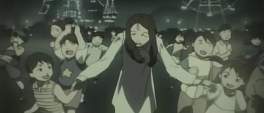
Also, I very highly recommend reading the novel multiple times. It's one of those with lots of hidden little gems that you won't see on your first read-through.